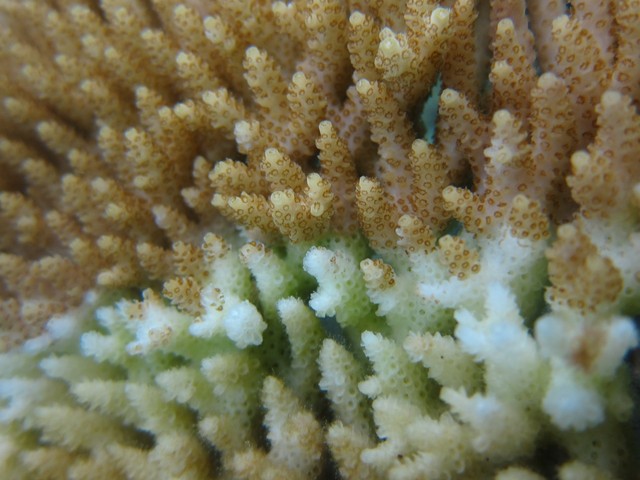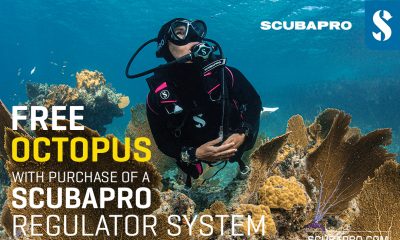Marine Life & Conservation
Study shows dredging can double risk of coral disease

Scientists in Australia have found that dredging activities can double the risk of diseases in coral reefs.
“At dredging sites, we found more than twice as much coral disease than at our control sites,” said the lead author of the study, Joe Pollock, a PhD candidate from the ARC Centre of Excellence for Coral Reef Studies (Coral CoE) at James Cook University (JCU) and the Australian Institute of Marine Science (AIMS).
“Corals require both light and food to survive,” Pollock said. “And unfortunately, dredging impacts corals on two fronts: increased turbidity means less light for photosynthesis, while increased levels of sediment falling onto the coral can interfere with their ability to feed.”
Already low on energy, the corals then must spend further energy cleaning the extra sediment from their surface. Such an energy imbalance can lead to chronic coral stress.
“Just like in any other organism, it seems that chronic stress can lead to increased levels of disease in corals,” Pollock says.
In the last 20 years, coral disease has increased across the world, and has become a significant factor in global coral reef decline. In some locations in the Caribbean, disease has diminished coral cover by as much as 95 percent.
This is the first study to examine the link between dredging and coral disease. It was conducted near Barrow Island, off the West Australian coast. The site is close to where an 18-month, 7-million cubic metre dredging project took place, developing a channel to accommodate ships transporting liquefied gas to a nearby processing plant. The site was in otherwise very good condition.
The most common diseases affecting corals after dredging events are the ‘white syndromes’, where the coral tissues fall off, leaving behind exposed, white coral skeletons. These coral diseases are chronic, and there are fears that they may linger well after the completion of dredging operations.
Dr Britta Schaffelke from AIMS, a co-author of the study, says many environmental stressors have been suggested as potential drivers of coral disease.
“Turbidity and sedimentation are critical pressures on the health of coral reefs and are affected by many human activities, especially in the coastal zone,” said Schaffelke.
“What this study does is highlight a direct link between coral disease and sedimentation and turbidity.”
Coastal industries provide economic stability, food security and reliable energy to billions of people around the world. As the pace of coastal development and demand for larger harbours escalates, the impact of elevated sediment and turbidity on the health of marine species is now a worldwide concern.
“Dredging is a pressing issue on many coral reefs throughout the world, including the Great Barrier Reef,” said Pollock.
“A solid understanding of the impacts of dredging, sediment and turbidity on coral health will be indispensable in the development of well-informed management and monitoring strategies for vulnerable coral reef ecosystems,” he concluded.
Source: www.tourismportdouglas.com.au
Marine Life & Conservation
Double Bubble for Basking Sharks

 The Shark Trust is excited to announce that, for two more days only, all donations, large or small, will be doubled in the Big Give Green Match Fund!
The Shark Trust is excited to announce that, for two more days only, all donations, large or small, will be doubled in the Big Give Green Match Fund!
Donate to Basking in Nature: Sighting Giants
The Shark Trust is hoping to raise £10k which will be doubled to £20k. This will go towards Basking in Nature: Sighting Giants. And they need YOUR help to reach they’re goal.
The Shark Trust’s citizen science project is to monitor and assess basking sharks through sightings; encouraging data collection, community engagement, and promoting nature accessibility. This initiative aims to enhance health and wellbeing by fostering a deeper connection with British Sharks.
Campaign Aims
- Increase citizen science reporting of Basking Sharks and other shark sightings to help inform shark and ray conservation.
- Provide educational talks about the diverse range of sharks and rays in British waters and accessible identification guides!
- Create engaging and fun information panels on how to ID the amazing sharks and rays we have on our doorstep! These can be used on coastal paths around the Southwest. With activities and information on how you can make a difference for sharks and rays!
- Promote mental wellbeing through increasing time in nature and discovering the wonders beneath the waves!
Donate, and double your impact. Click Here
Marine Life & Conservation
Leading UK-based shark conservation charity, the Shark Trust, is delighted to announce tour operator Diverse Travel as a Corporate Patron

 Corporate Patrons provide a valuable boost to the work of The Shark Trust. The Trust team works globally to safeguard the future of sharks, and their close cousins, the skates and rays, engaging with a global network of scientists, policymakers, conservation professionals, businesses and supporters to further shark conservation.
Corporate Patrons provide a valuable boost to the work of The Shark Trust. The Trust team works globally to safeguard the future of sharks, and their close cousins, the skates and rays, engaging with a global network of scientists, policymakers, conservation professionals, businesses and supporters to further shark conservation.
Specialist tour operator Diverse Travel has operated since 2014 and is committed to offering its guests high quality, sustainable scuba diving holidays worldwide. Working together with the Shark Trust will enable both organisations to widen engagement and encourage divers and snorkellers to actively get involved in shark conservation.
“Sharks are truly at the heart of every diver and at Diverse Travel, we absolutely share that passion. There is nothing like seeing a shark in the wild – it’s a moment that stays with you forever!” says Holly Bredin, Sales & Marketing Manager, Diverse Travel.
“We’re delighted to celebrate our 10th year of business by becoming a Corporate Patron of the Shark Trust. This is an exciting partnership for Diverse and our guests. We will be donating on behalf of every person who books a holiday with us to contribute towards their vital shark conservation initiatives around the world. We will also be working together with the Trust to inspire divers, snorkellers and other travellers to take an active role – at home and abroad – in citizen science projects and other activities.”
Paul Cox, CEO of The Shark Trust, said:
“It’s an exciting partnership and we’re thrilled to be working with Diverse Travel to enable more divers and travellers to get involved with sharks and shark conservation. Sharks face considerable conservation challenges but, through collaboration and collective action, we can secure a brighter future for sharks and their ocean home. This new partnership takes us one more valuable step towards that goal.”
For more information about the Shark Trust visit their website here.
For more about Diverse Travel click here.
-

 News3 months ago
News3 months agoHone your underwater photography skills with Alphamarine Photography at Red Sea Diving Safari in March
-

 News3 months ago
News3 months agoCapturing Critters in Lembeh Underwater Photography Workshop 2024: Event Roundup
-

 Marine Life & Conservation Blogs3 months ago
Marine Life & Conservation Blogs3 months agoCreature Feature: Swell Sharks
-

 Blogs2 months ago
Blogs2 months agoMurex Resorts: Passport to Paradise!
-

 Blogs2 months ago
Blogs2 months agoDiver Discovering Whale Skeletons Beneath Ice Judged World’s Best Underwater Photograph
-

 Gear Reviews2 weeks ago
Gear Reviews2 weeks agoGEAR REVIEW – Revolutionising Diving Comfort: The Sharkskin T2 Chillproof Suit
-

 Marine Life & Conservation2 months ago
Marine Life & Conservation2 months agoSave the Manatee Club launches brand new webcams at Silver Springs State Park, Florida
-

 Gear Reviews3 months ago
Gear Reviews3 months agoGear Review: Oceanic+ Dive Housing for iPhone


















